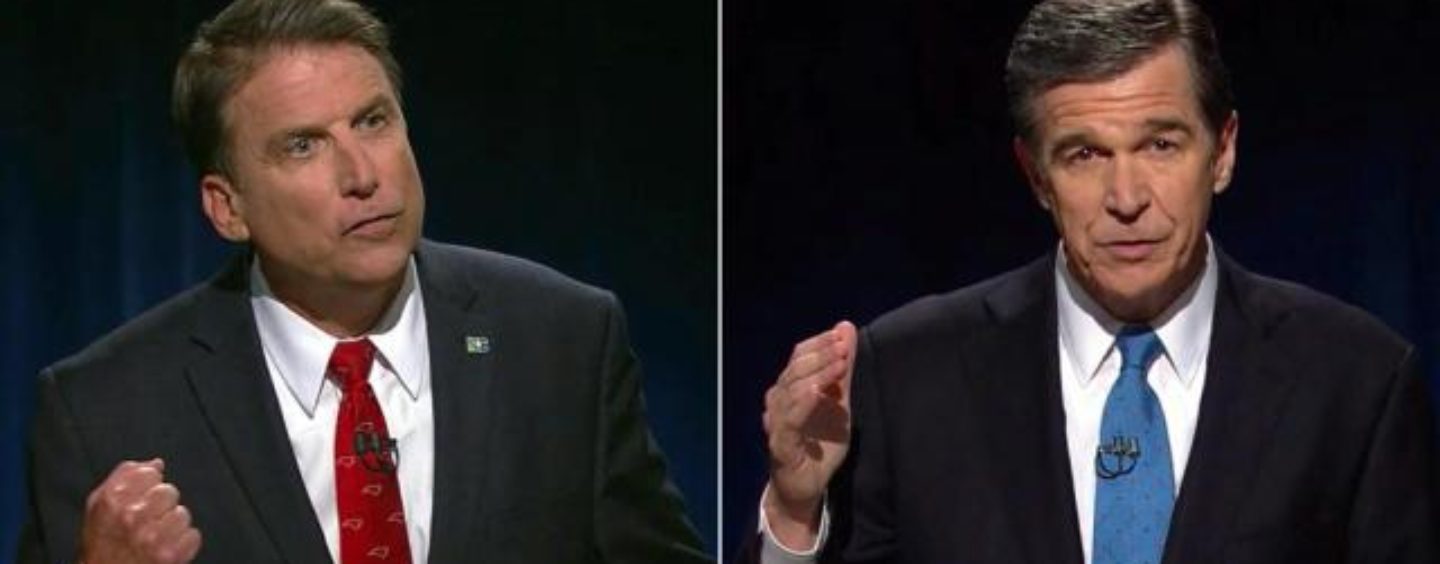RALEIGH, N.C. — Recently filed state and federal campaign finance reports suggest a national Republican organization may have piped as much as $1.5 million in corporate contributions to the North Carolina Republican Party, prompting a formal complaint from Democrats that the GOP is circumventing state limits on the size of individual contributions and prohibitions on corporate donations.
Officials with both the state Republican Party and the Republican Governors Association, a national group that supports GOP candidates such as Gov. Pat McCrory, insist they have followed both federal and state law. Corporate contributions to parties and candidates are illegal under North Carolina campaign finance law, with rare exceptions for things such as referendum efforts and accounts used to pay for party headquarters.
RELATED: 23 States to Spot Voter Fraud
McCrory is running for re-election against Attorney General Roy Cooper, a Democrat.
In this case, records show the RGA collected money from corporations such as Cary’s SAS institute – which alone gave $125,000 to the group on Sept. 7 – through through its “527” organization, which can legally accept and spend unlimited dollars from corporations and individuals alike. The RGA in turn put $13 million into RGA Right Direction, a super PAC that it controls and for which it is the sole funder. It is that super PAC that has donated $1.5 million this year, including $500,000 on Oct. 25, to the North Carolina Republican Party.
The state party is responsible for get-out-the-vote and other organizational efforts behind GOP candidates, including McCrory. It also conducts mass mailing efforts on behalf of state candidates.
“The State Board of Elections must step in to halt this scheme,” reads the Democratic Party’s complaint, signed by executive director Kimberly Reynolds.
Although the complaint, which was filed Saturday, asks the state board to fine McCrory, it doesn’t present evidence that the governor’s campaign was a direct recipient of the funds or knew about their source.
A spokesman for the RGA said Saturday that the contributions do not violate either the prohibition on corporate contributions or limitations on contributions from single donors. In an email, he said Democrats did not seem to understand the state’s campaign finance laws.
“This baseless complaint from the North Carolina Democratic Party is a direct attempt to mislead voters. The RGA’s contributions contained no corporate dollars, as compliant with state law,” RGA spokesman Jon Thompson said in response to questions about the transactions. “Unable to articulate a cohesive message about the issues or counter North Carolina’s positive momentum, it’s no surprise that Roy Cooper and his friends are using outright falsehoods and fabrications as the closing message for his struggling campaign.”
Thompson pointed to reports showing that the Democratic Governors Association put money into the state Democratic Party, including a $1 million transfer reported in by the National Journal last week, and asked how that was different.
Contributions to the state Democratic Party come from a PAC known as Democratic Action, a federal PAC that Democratic Party officials say takes contributions only from individuals and in amounts limited to $5,000 per year, an assertion federal records appear to confirm. Those contributions would be legal under state law.
RELATED: Trumps Evidence of Voting Fraud
Donations obscured
The structure of the RGA donations, which were reported in part to the state board Thursday, obscures the origin of the money that came to North Carolina. Records available through the IRS, the Federal Elections Commission and the State Board of Elections don’t indicate if or how corporate and individual money might be segregated.
“We have received the complaint and will provide notice to appropriate parties, consistent with agency practice,” said Kim Strach, director of the State Board of Elections.
Strach has asked the state Republican Party, the RGA and the McCrory campaign committee to answer the complaint by 6 p.m. Tuesday.
Bill Gilkeson, a lawyer and campaign finance expert who worked 25 years helping draft election laws at the General Assembly, had not seen either the complaint or the campaign finance filings involved, but he said the facts described by a reporter did raise questions.
“It seems like a legitimate complaint,” he said.
Election Day is Nov. 8, and it seems unlikely such a thorny campaign finance issue will be resolved before then. In 2004, a State Board of Elections case involving the RGA and Republican gubernatorial candidate Patrick Ballantine was contested through much of the next year.
“We have a legal team that looks at this to make sure we can take the money before we get it,” said Dallas Woodhouse, executive director of the North Carolina Republican Party.
He could not immediately say how that vetting process worked and referred questions about specifics to the RGA.
Woodhouse also raised the objection that the RGA and state party were being asked to “prove their innocence” because public records are unclear on whether personal and corporate contributions have, in fact, been commingled.
“It’s very hard for me to prove a negative,” he said. “We have reported everything we could possibly report.”
Pattern followed in other states
It is not at all unusual for big money, including money raised by labor unions and corporations, to find its way into elections. For example, national Democratic and Republican groups alike have have run their own television ads or piped money through organizations such as N.C. Families First to play a part in the 2016 gubernatorial campaign.
The RGA itself has spent money in the state, mainly on television ads critical of Cooper. Legally, there appears to be no problem with that sort of spending because “independent expenditure” efforts, which are do not coordinate with candidates and parties, can raise and spend unlimited sums.
What’s different in this case is the circuitous, but apparently uninterrupted, path public records lay out from large individual contributions and corporate such donors as Charlotte-based Duke Energy – which gave $40,000 to the RGA on July 6 – to the the state Republican Party.
As part of if its efforts to comply with North Carolina election law, RGA Right Direction created a separate state political action committee to account for its activity in North Carolina. However, that committee would be limited to taking $5,100 a piece from individual donors. The bulk of the RGA’s contributions come from large companies. According to the Center for Responsive Politics, the RGA’s top 20 contributors, led by $2 million from Koch Industries, accounted for more than $13 million. The Democrats’ complaint alleges that the funds not only appear to mingle corporate and personal contributions, but they are in excess of the $5,100-per-person limit.
The Democratic Party’s complaint alleges only $44,240 taken in by the RGA could legally be used in North Carolina.
This is not the first time the RGA has appeared to wash corporate money through its super PAC before sending it to a state with limitations on corporate contributions. In 2012, the Center for Public Integrity found money that followed similar paths to North Dakota’s Republican governor and then-Indiana Congressman Mike Pence, who won his race for governor of that state. Both of those states have limitations on corporate donations. The RGA gave to Pence’s campaign again in 2016, before he was tapped as the GOP’s vice presidential nominee.
Are you a victim of fraud or money scam? Share your story with us on the Money Credit and You Facebook page!
Original article published on WRAL.





